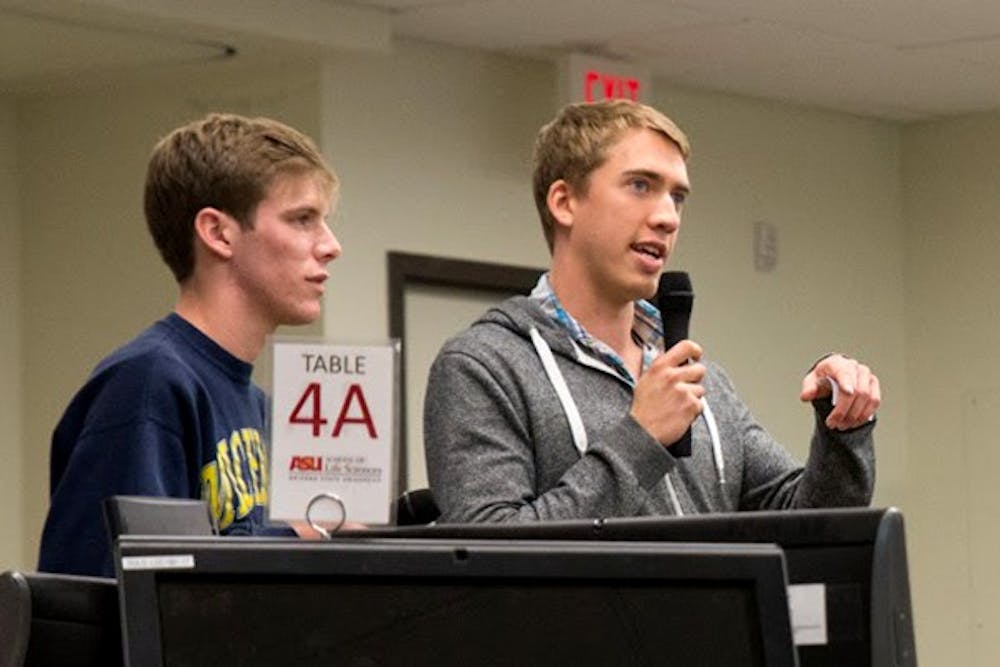 Sophomore Michael Zipperer leads a discussion on utopian societies with both ASU and Leuphana University students. Undergraduate students Michael Zipperer (right) and James Macdonald met on weekends for a total of 3-4 hours to prepare for the lesson. (Photo by Andrew Ybanez)
Sophomore Michael Zipperer leads a discussion on utopian societies with both ASU and Leuphana University students. Undergraduate students Michael Zipperer (right) and James Macdonald met on weekends for a total of 3-4 hours to prepare for the lesson. (Photo by Andrew Ybanez)The collaborative Global Classroom Project brought together the second cohort of students from ASU and Leuphana University Lüneburg in Germany this semester to work shoulder-to-shoulder on city-related projects without leaving classrooms in their home countries.
The goal of this global, intercultural and interdisciplinarian project is to create a new model of classroom where students can share knowledge between different countries. The concept becomes real with the help of modern technology as students communicate with their overseas partners during every class via high-quality video connection.
The class is divided into groups composed of both American and German students, who work on mutual sustainability-related projects. An academic trip in May to Germany will crown three semesters of hard work.
Guido Caniglia, a post-doctoral researcher for the Global Classroom Project, has organized most of the activities for the class and called it a “breath of fresh air”.
“We teach them to be creative (and) to work in the real world," he said. "We teach them how to work in teams (and) have work plans and responsibilities."
This semester gathered the second cohort of students with various majors and backgrounds — urban planning, global health, business sustainability and biology and society, among others. Such variety of backgrounds allows the project to look at sustainability-related issues from various perspectives.
Students work on a diverse range of projects, from artists’ district and its influence on sustainability to the spread of infections in cities.
“The framework is cities: the topic, the questions and the problems that the students address, need to take place in cities,” Caniglia said. “It ends up being all possible things.”
During the first semester, students start their journey by discussing conceptual issues and conducting exploratory local work such as mapping and a seven-hour transit walk. In contrast, the third semester students focus on executing their final projects and preparing for the presentation in Germany.
Biology and society and psychology sophomore Alexis Abboud has been studying how sustainable a city’s response to infectious influenza pandemics is as a part of an international group for the third semester.
 Post-doctoral researcher Guido Caniglia begins video transmission with a class from Leuphana University. Global classrooms have cameras connecting both rooms and students discuss topics using microphones. (Photo by Andrew Ybanez)
Post-doctoral researcher Guido Caniglia begins video transmission with a class from Leuphana University. Global classrooms have cameras connecting both rooms and students discuss topics using microphones. (Photo by Andrew Ybanez)“It has been a lesson in patience for everybody,” she said. “It’s the first time this class has ever been done, so we’ve all had to say, 'It’s not going to be perfect,' and we all are going to work with each other to figure out how to make things better.”
Aside from personal adjustments, the technological side of the project didn’t always run smoothly.
“Sometimes you spend 20 minutes trying to set up the thing you’re supposed to be using to make a 10-minute assignment,” Abboud said.
To make this project real, students used Vidyo, Google Hangouts, Skype, Adobe Connect and social media. Charles Kazilek, associate dean of technology, media and communications in the College of Liberal Arts & Sciences said there are newer cameras coming out, which will allow to control far-side and zoom in optically.
A self-described technology advocate, Kazilek said he believes it’s always important to figure out what its strength is and use it for students’ benefit. In this case, video communication is much better than texting or chatting, he said.
“You’re missing a lot of the stream and a lot of really pertinent information, without video system,” he said. “There’re so many visual cues that occur, that it’s really important to include these communications. Now we can do this across the world, and that’s where richness comes in.”
Kazilek said video communication can be better than personal presence because it allows students to focus on the person on the screen, and in some cases even saves time.
“If we did it (the) old-fashioned way, and we brought German students here, there’s a lot of getting used to each other, understanding what’s going on with the projects,” he said. “So you really don’t make as much use of that time.”
Regardless of all the challenges, Rachel Gur-Arie, a biology and society sophomore, said the Global Classroom Project has been one of the most important experiences in her life.
“All the ups and downs made it worth it, and I established connections with people that I, personally, would have never met,” she said. “I met my best friends in this class and the greatest mentors, so I honestly wouldn’t have changed a thing.”
Reach the reporter at kmaryaso@asu.edu or follow her on Twitter @KseniaMaryasova




